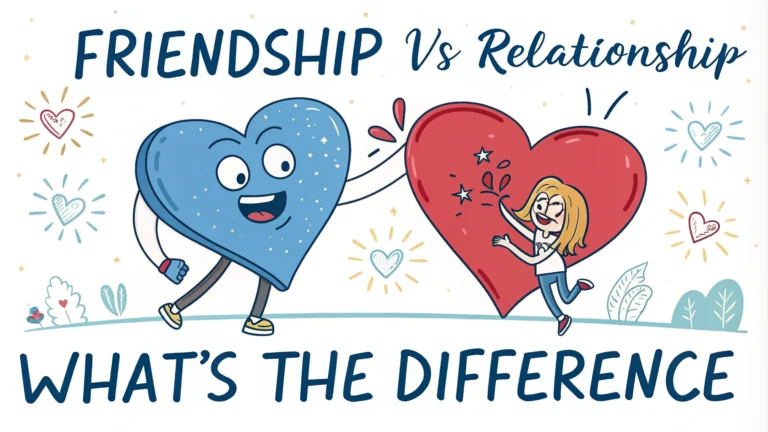The lines between friendship and romantic relationships often blur, creating confusion about boundaries and expectations. Many people struggle to navigate these distinct types of connections and their unique characteristics.
A clear understanding of both bonds helps maintain healthier interactions and set appropriate boundaries. This quick guide breaks down the key differences and helps you recognize where your connections stand.
Key Elements of Friendship
Friendships thrive on mutual support, shared interests, and emotional connection without romantic or physical attraction. These relationships typically offer more flexibility and less pressure than romantic partnerships.
- Based on platonic affection and companionship
- No expectations of exclusivity
- Flexible boundaries and commitments
- Focus on shared activities and emotional support
Components of Romantic Relationships
Romantic relationships combine emotional intimacy with physical attraction and typically involve deeper commitment. These connections usually follow different social rules and expectations.
- Physical and emotional intimacy
- Expectations of exclusivity (in most cases)
- Higher level of commitment
- Shared future planning
Setting Healthy Boundaries
Clear boundaries help maintain the integrity of both friendships and relationships. Understanding where to draw these lines prevents misunderstandings and emotional complications.
| Friendship Boundaries | Relationship Boundaries |
|---|---|
| Respect personal space | Define exclusivity terms |
| Maintain emotional balance | Set intimacy limits |
| Honor time commitments | Establish future expectations |
Moving Between Friendship and Romance
Changing relationship dynamics requires careful communication and clear expectations. The shift between friendship and romance affects both people involved and their wider social circle.
- Have an open discussion about feelings
- Address potential risks to existing friendship
- Set new boundaries early
- Give space for adjustment
Avoiding Mixed Signals
Actions and words need to align to prevent confusion in any relationship type. Mixed messages often lead to misunderstandings and hurt feelings.
| Common Confusion Points | Clear Solutions |
|---|---|
| Excessive physical contact | Set touch boundaries |
| Intimate conversations | Define comfortable topics |
| One-on-one time | Clarify hangout intentions |
Balancing Different Relationships
Maintaining both friendships and romantic relationships requires time management and clear priorities. Good balance creates a stronger support network and richer social life.
- Schedule dedicated time for each
- Keep friend groups separate when needed
- Maintain individual interests
- Respect everyone’s boundaries
Making Smart Relationship Choices
Understanding your personal needs helps determine the right type of connection for each situation. Strong relationships of any kind need regular evaluation and honest communication.
“The best relationships – romantic or friendly – are built on mutual respect and clear understanding.”
Key takeaways for healthy relationships:
- Know your relationship goals
- Communicate boundaries clearly
- Respect others’ choices
- Stay true to your values
FAQs About Friendship vs Relationship
Q: What are the main differences between friendship and romantic relationships?
A romantic relationship typically includes:
- Physical intimacy and sexual attraction
- Emotional exclusivity
- Long-term commitment plans
- Shared financial responsibilities
While friendships focus on emotional support and shared interests without romantic elements.
Q: Can friends with benefits turn into a relationship?
Yes, FWB arrangements can evolve into relationships, but studies show only about 15-20% successfully transition to committed partnerships. Clear communication about changing feelings is essential.
Q: How do you know if you’re crossing the friendship boundary?
Signs include:
- Feeling jealous when they date others
- Frequent physical contact or flirting
- Thinking about them romantically
- Making excuses to spend time alone together
Q: What makes platonic friendships different from romantic ones?
Platonic friendships lack romantic or sexual attraction while maintaining emotional closeness. They often feel more relaxed and have fewer expectations.
Q: Is it normal to feel attracted to your best friend?
Yes, developing feelings for close friends is common due to emotional intimacy and shared experiences. Studies show approximately 68% of people have been attracted to a close friend at some point.
Q: How do you maintain boundaries in opposite-sex friendships while in a relationship?
Key strategies include:
- Setting clear boundaries with both parties
- Including your partner in activities
- Avoiding one-on-one situations that could be misinterpreted
- Being transparent about all interactions
Q: What are signs a friendship is turning into love?
Common indicators include:
| Emotional Signs | Behavioral Signs |
|---|---|
| Butterflies when meeting | Making extra effort in appearance |
| Constant thoughts about them | Finding excuses for physical contact |
| Jealousy of other relationships | Prioritizing their company |
Q: Can you be best friends with your romantic partner?
Yes, research shows relationships with a strong friendship foundation tend to have higher satisfaction rates and last longer. Mutual respect and shared interests strengthen both aspects.
Q: How do you know if it’s just friendship or something more?
Consider these factors:
- Physical attraction presence
- Desire for romantic exclusivity
- Future planning involving the person
- Different emotional intensity compared to other friendships
Q: What happens to friendships after starting a relationship?
Friendships often require more intentional maintenance after starting a relationship. Studies show people typically lose 2-3 close friends when entering a serious relationship unless they actively work to maintain connections.



















